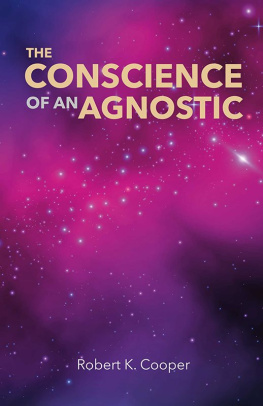2019 Robert Cooper All rights reserved. No part of this publication may be reproduced, distributed, or transmitted in any form or by any means, including photocopying, recording, or other electronic or mechanical methods, without the prior written permission of the publisher, except in the case of brief quotations embodied in critical reviews and certain other noncommercial uses permitted by copyright law ISBN: 978-1-54399-277-9 eBook ISBN: 978-1-54399-278-6
Introduction
L et me just state at the outset that I am not an atheist. I think it is possible that there is some sort of transcendent, creative intelligence beyond the universe. I also think it is possible that, out of the many religions in the world, Christianity may be the one true religion. However, I must confess that I am somewhat skeptical. Why would God want for so many brilliant people to disagree so vehemently regarding one of the most important questions of all; namely, His existence? Throughout history there have been brilliant Christians and brilliant people of many other religious affiliations, along with brilliant atheists and agnostics. If they cant agree on the existence of Divine Intelligence, then what chance do the rest of us have? Its certainly very puzzling to me. To put it as succinctly as I can, I am willing to accept the reality of God, but thus far, I have not been able to find it and Im in my late sixties. So, in order to be intellectually honest with myself and others, I feel that I must be content to be agnostic unless I have a major revelation at some point in the future.
Chapter 1
What is Agnosticism?
A gnosticism is the view that the existence of a god, in the sense of a supernatural being, is simply unknowable. Agnosticism contends that the existence of a god or gods can neither be proven nor disproven, that it is beyond the capacity of the human mind to ascertain whether a god or gods exist. An agnostic might also be an individual who professes neither of two opposing positions on a particular subject. The word agnostic means without knowledge.
Possibly the earliest professed agnostic was the Greek philosopher Protagoras, who originally came from the city of Thrace in northern Greece and later established himself as a teacher and advisor in Athens. He was considered by Plato to be a sophist, which was a certain type of teacher in ancient Greece during the fourth and fifth centuries BC. A number of sophists utilized the tools of philosophy and rhetoric, while others gave instruction in subjects such as music, athletics, and mathematics, all in an attempt to teach excellence and virtue primarily to young statesmen and nobility.
Protagoras is also considered to have caused a major controversy by claiming that man is the measure of all things, which was interpreted by Plato to mean that there is no absolute truth. There is only that which individuals consider to be the truth. This idea of individual relativity was quite revolutionary at the time and stood in sharp contrast to other philosophical concepts which argued that the universe was based on objective forces apart from human influence or perceptions.
The original coining of the term agnosticism in the 1880s is generally credited to Thomas Henry Huxley who was an English biologist specializing in comparative anatomy. He was sometimes referred to as Darwins Bulldog due to his strong support of Charles Darwins theory of evolution. Huxley was somewhat reluctant to accept a few of Darwins ideas, such as gradualism and natural selection, but he was unwavering in his public support of Darwin. Huxley played a major role in the spread of scientific education in Great Britain and was opposed to the more extreme versions of religious tradition. He is quoted as stating, Agnosticism, in fact, is not a creed, but a method, the essence of which lies in the rigorous application of a single principle...the fundamental axiom of modern science...In matters of the intellect, follow your reason as far as it will take you, without regard to any other consideration...In matters of the intellect, do not pretend that conclusions are certain which are not demonstrated or demonstrable.
There are a number of different types of agnosticism that will be briefly explained here:
1) Strong Agnosticism - This point of view is sometimes referred to as hard agnosticism, closed agnosticism, strict agnosticism, absolute agnosticism, or epistemological agnosticism. It contends that the issue of the existence or non-existence of a god or gods cannot be known due to the inability of men to confirm any experience with anything other than another subjective experience.
2) Mild Agnosticism - This point of view is sometimes referred to as weak agnosticism, soft agnosticism, open agnosticism, empirical agnosticism, or temporal agnosticism. It contends that the issue of the existence or non-existence of a god or gods is unknown at this point in time, but it may not be completely unknowable at some point in the future. Therefore, the most logical course of action is to simply suspend judgment until more reliable evidence is made available.
3) Pragmatic Agnosticism - This point of view contends that one cannot know, with any degree of certainty, if a god or gods exist. However, even if they do exist, they do not seem to show sufficient interest in the affairs of mankind, so there is really no reason to concern oneself with them.
4) Agnostic Theism - This point of view is sometimes referred to as religious agnosticism. An agnostic theist believes in the existence of a god or gods but considers the basis of this proposition to be inherently unknowable.
5) Agnostic Atheism - This is the point of view of those people who claim not to know of the existence or non-existence of a god or gods but who reject such a possibility in the absence of any solid, scientific evidence.
Chapter 2
What is Religious Faith?
T he dictionary definition of faith is that it is the theological virtue defined as secure belief in God and a trusting acceptance of Gods will. Religious faith could also be defined as confidence or trust in a particular system of religious belief. For a Christian, these are not just empty words on a page but rather serve as the basis for ones entire life. Religious faith is acceptance of what we cannot perceive in a physical sense, but which we feel deeply within ourselves. It is often considered to be a basic element that is required in order to have any relationship with God. Religious faith is the assurance that those things which are revealed and promised in the word of God, despite the fact that they are not seen, are true and provide the believer with the conviction that what he expects to occur in faith will come to pass. Rationality is based on reason and facts that can be scientifically determined, whereas religious faith is based on inspiration or a perceived revelation. There are some who claim that religious faith transcends reason and that those who have it often lead blessed, deeply spiritual lives despite the trials and setbacks they may encounter as they journey through this earthly existence. They consider religious faith to be a precious possession in spite of the fact that it is not a visible or tangible entity.
There are numerous biblical references to religious faith. Some of the most often cited verses are the following:














